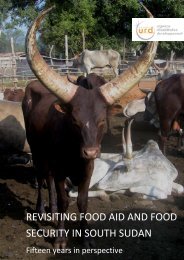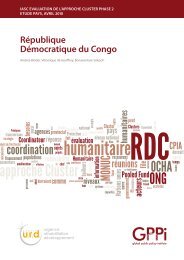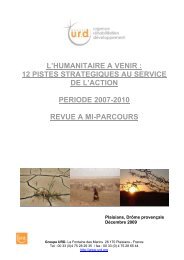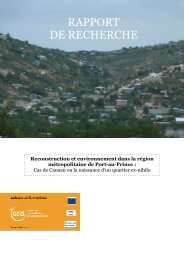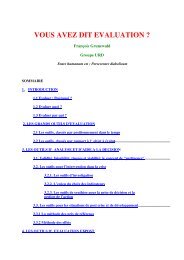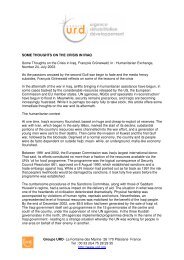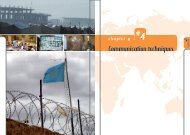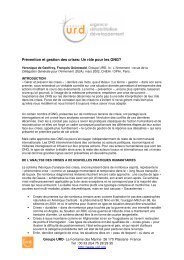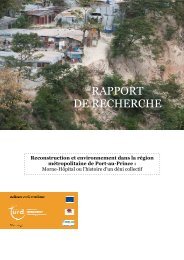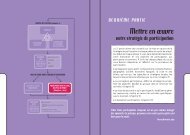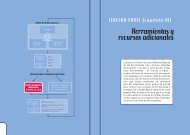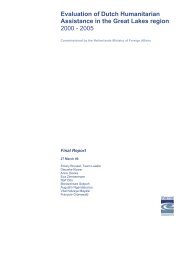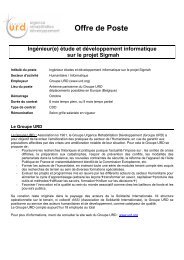Kabul Urban Survey - Groupe URD
Kabul Urban Survey - Groupe URD
Kabul Urban Survey - Groupe URD
You also want an ePaper? Increase the reach of your titles
YUMPU automatically turns print PDFs into web optimized ePapers that Google loves.
Extract from Pathak, <strong>Kabul</strong> 2006, “<strong>Urban</strong> Policy Issues, Priorities and Recommendations for<br />
<strong>Kabul</strong>” Draft for discussion<br />
- “In 2002, national visions, priorities and strategies are developed within the “National<br />
Development Framework”: Some urban issues were drafted for different afghan cities<br />
:”The key national urban management goals articulating government’s vision for this<br />
sector, included: (i) Investment in a balanced urban development program across the<br />
country: (ii) Municipal infrastructure development in twelve cities; (iii) Opening up energy<br />
and infrastructure sectors to private investment; (iv) Reconstruction and rehabilitation of<br />
the power system; (v) Systematic rebuilding of <strong>Kabul</strong> and other cities that have been<br />
destroyed.<br />
- In 2004, the “Securing Afghanistan’s Future” recognizes the range of post-conflict<br />
urban development challenges facing Afghanistan with the issues “of land allocation,<br />
uncertain properties rights, critical provision of urban services.”[…] This document also<br />
estimated urban development and investment needs of major cities in the country, with a<br />
purpose of attracting donor funding for urban development priorities.”<br />
- In 2004, a “National <strong>Urban</strong> Program» was launched as one of the 12 National Priority<br />
Programs, which is an indication of recognition of the urban sector in the national<br />
development. The National <strong>Urban</strong> Program was designed to provide a cohesive long<br />
term framework for urban development in the country. The Program had a budget of US<br />
$1,085 million for the next 15 Years.<br />
- In 2005 <strong>Urban</strong> Development and Housing Strategy. The Strategy recognizes that<br />
special attention will be needed to address policy issues facing <strong>Kabul</strong> City.” The Strategy<br />
also realizes that the urban sector has remained acutely under-funded during the past<br />
four years, while a major proportion of the emergency relief and reconstruction effort was<br />
directed to rural areas. “<br />
- In 2005, the Government of Afghanistan initiated the process of preparing a<br />
comprehensive Afghanistan National Development Strategy (ANDS) with the twin<br />
objective of economic development and poverty reduction. As a part of this initiative, an<br />
<strong>Urban</strong> Development and Housing Strategy has also been prepared that builds on the<br />
past efforts to develop an urban development strategy and program for the country. The<br />
Strategy includes a number of fundable projects for <strong>Kabul</strong>, other major cities as well as<br />
provincial cities.” 8<br />
• Importance of strengthening Municipal Law<br />
As explained above, a national urban framework is being drawn up at the national level but at<br />
the municipal level there are many gaps and weaknesses. This is the case for all<br />
municipalities in Afghanistan. But <strong>Kabul</strong> is the Afghan capital and for <strong>Kabul</strong> Municipality, the<br />
main issue consists in clarifying its role and urban responsibilities on the city within the<br />
institutional game. This implies having a clear institutional statute and looking precisely at the<br />
terms of Municipal Law. Some of the components of Municipal Law need to be revised but<br />
some just need to be applied in order to establish the KM’s capacity and rights to manage its<br />
own city. In 2004, when acting as an advisor for UN-HABITAT, Pathak participated in<br />
discussions on Municipal Law evolution with urban stakeholders, Afghan engineers and<br />
foreign advisors, mayors and senior officials of <strong>Kabul</strong>, but also from Kandahar, Herat and<br />
Bamiyan municipalities. She summarised the main issues in a draft for discussion “Municipal<br />
Law of Afghanistan” 9 in December 2004. On the basis of this survey, Mac Auslan, a<br />
consultant, prepared a draft on Municipal law in August 2005 in order “to look at the<br />
definition, the structures and functions of and manner of exercising powers by<br />
8 Pathak P., “<strong>Urban</strong> Policy Issues, Priorities and Recommendations for <strong>Kabul</strong>, Draft for discussion<br />
<strong>Kabul</strong> 2006<br />
9 Pathak P., “Municipal Law of Afghanistan”. Draft for discussion, <strong>Kabul</strong>, 2004<br />
Page 28



